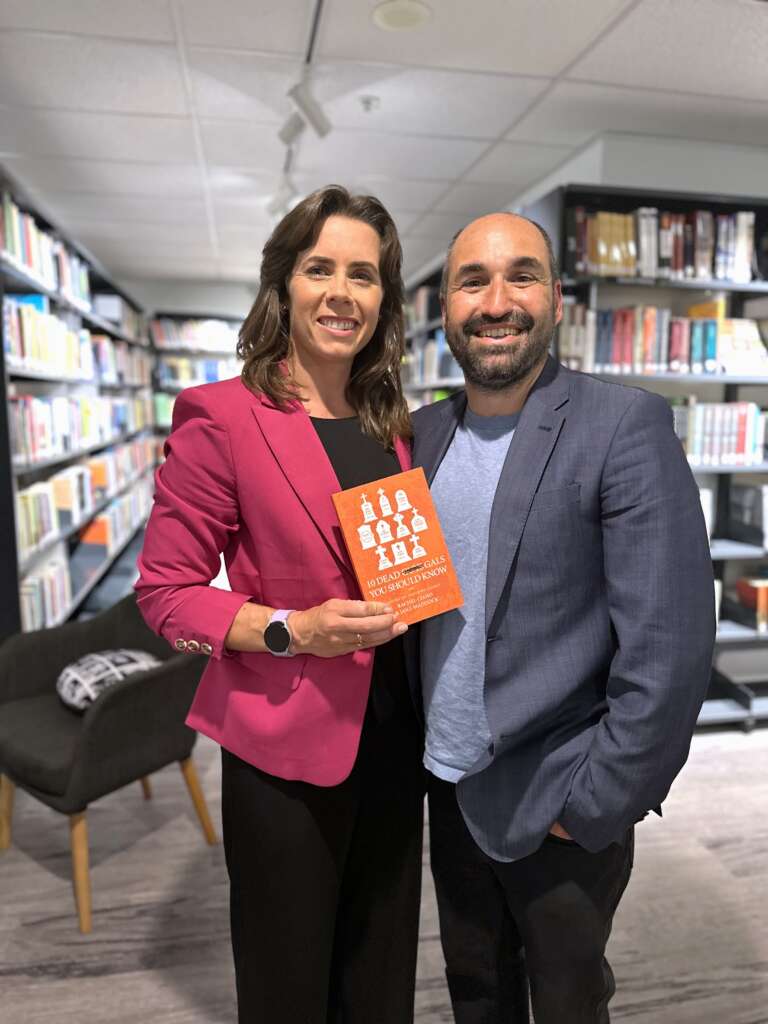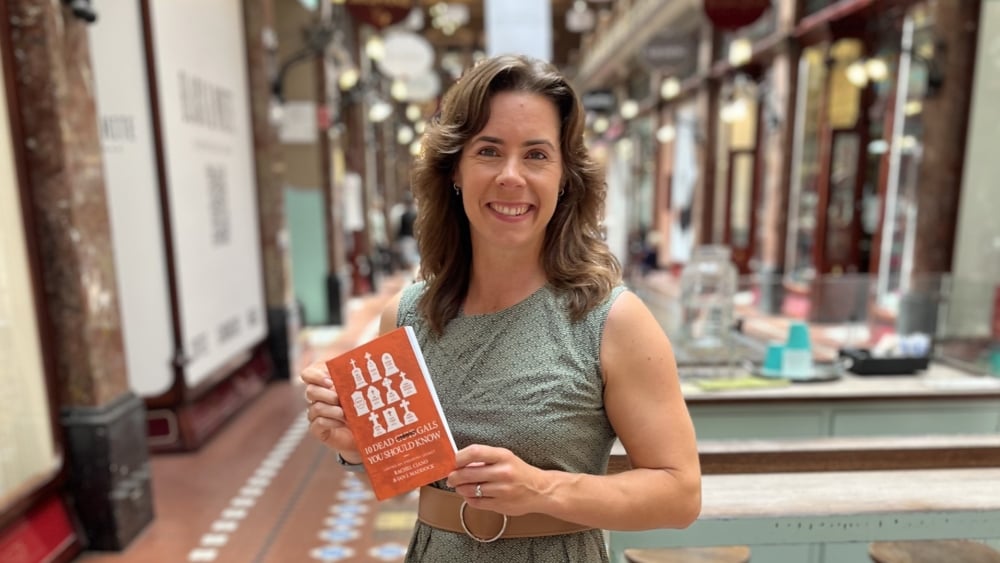Rachel Ciano wrote her new book, 10 Dead Gals You Should Know, during a really difficult year of strain and mental anguish. But diving deep into these women’s lives brought her great comfort.
“These women really felt like companions on the journey. I loved having their company,” says Rachel, a Sydney Missionary and Bible College lecturer who wrote the book with her colleague Ian Maddock.
“I saw that I was not the only one going through hardship and that God doesn’t always deliver you. But even when God doesn’t deliver you from suffering, he is with you in it. God can comfort us in many ways and the stories of these women in the book is one way he can do that.”
The stories of these ten women who span 2000 years of history, provide encouraging insights into what it was like for these women to live out faithful Christian lives in their contexts.

Rachel and her husband Ross at the book launch.
Some are women of action, like social campaigner Catherine Booth, who worked on many different things in Victorian Britain, including child prostitution and raising the age of consent.
Others are women of the mind, such as Lady Jane Grey, who was a key part of the 16th-century Protestant Reformation and who was executed in 1554 at the age of only 17, and Anne Hutchinson, who was ex-communicated in 1638 in the colony of Massachusetts for standing against the Puritan church in her belief in the sufficiency of free grace.
“Their faith is the same as our faith. Their God is our God.” – Rachel Ciano
Rachel particularly loved writing about Perpetua, a young mother in the second-century Roman Empire who became a Christian and died for her faith in a Roman arena because she would not deny Christ.
“Perpetua’s legacy really resonates with me. Not because her faith was particularly strong or she was mighty, to be able to act so graciously in the arena, even with the gladiator who ends up with a knife to her throat. But I think she had just deep conviction that the Lord was with her. We see that in her time in jail,” says Rachel.
“For many of these women, the Lord doesn’t deliver them from hardship. But they know that the Lord is with them. And Perpetua had that. She’s almost skipping to her death. It’s the day of her victory – that’s how it’s called in her biography.
“These stories are not about people who are so great and we can never be one of them. Their faith is the same as our faith. Their God is our God. The same God who stood with her in the arena stands with us and our children. The same spirit who resided in her resides in us. That’s where I find encouragement and consolation that God will help us through anything. He’ll be with us in any trial we face, even if he may not deliver us.”
The book was written as part of an ADM Fellowship and is a follow-up to 10 Dead Guys You Should Know written by Rachel, with Stuart Coulton and Ian Maddock. Both books are aimed at a popular level, and I can attest that 10 Dead Gals is easy to read, even for someone who doesn’t identify as a history nerd.
“Evangelicals can feel a little bit nervous about what to do with Mary.”
The authors chose their ten women to give a good spread across 2000 years and to uncover stories that were hidden for many Christians. While their first subject – Mary, the mother of Jesus – is not hidden, Rachel believes she has been obscured by the vision of her that developed in subsequent centuries.
“The way that she’s portrayed by people who venerate her means that her real story gets obscured. I think the evangelicals can feel a little bit nervous about what to do with Mary. I wanted to put together a historical portrayal of her, which we find in the Scriptures. I wanted to examine the story that emerged, and then provide a bit of a recovery as well for evangelicals to see her as a model of faith and discipleship.”
The woman who inspires Rachel most is Catherine Booth, co-founder of the Salvation Army, “particularly for the way that she viewed all people as made in the image of God, which in her particular context was the down and out in Victorian Britain. So it was the poor, it was children, it was the vulnerable, and it was prostitutes.
“I find her inspiring as well because she wasn’t a woman who had inherently great strength. She lived in chronic pain; she had many physical ailments and weaknesses. And she kept stepping up and serving the Lord as best she could. I don’t think any of these are portraits of women who are strong and mighty and magnificent. They’re human women who the Lord uses, and she’s one of them.”
The most appalling story is of Catherine of Siena, a medieval woman who died early by refusing to eat anything but the Eucharist.
“There is critique to be offered of Catherine of Siena and of the movement which she occupied, which had a very dualistic view of the body, which is the body is to be brought into submission because the spiritual is greater,” explains Rachel.
“And so that’s what she was doing with the lack of food, lack of sleep, uncomfortable bed, drinking in the pus of a breast cancer victim, surviving on the Eucharist alone – that idea of spiritual feeding on the Eucharist would be enough to sustain their mortal bodies.”
A story that almost wasn’t told
Rachel gained a new insight during her investigations of Gladys Aylward, a British missionary to China in the early 20th century whose story was made into a film starring Ingrid Bergman.
“I knew of Gladys Aylward’s story, but I did not know how it came to be discovered and how that pointed to what a self-effacing woman she was,” she says.
“She was a revelation to me.”
“What strikes me about her story is that it very nearly wasn’t a story. It was a journalist who picked up two lines in a newspaper, followed a hunch that she would have something interesting to share, and she said, no, nothing to see here. And then she lets slip 15 minutes into conversation a little thread that he then pulls on, and the story comes out.”
That story is of how a poorly educated woman is rejected for mission service in China because of her poor learning of Chinese, then finds her way out there through hazardous train journeys through Siberia and Russia during the Sino-Japanese war. She campaigns against foot binding and leads 100 orphans, many wounded or sick, 400km through the mountains from Yangchen to Xian without food or money.
“That her story nearly wasn’t a story astounds me, but it points to the sort of woman she was. I think it was because of her vision of Jesus and his stories that she told every night in the hostel – that’s what she thought was amazing. She was a revelation to me, and I enjoyed diving deeper into her story.”





